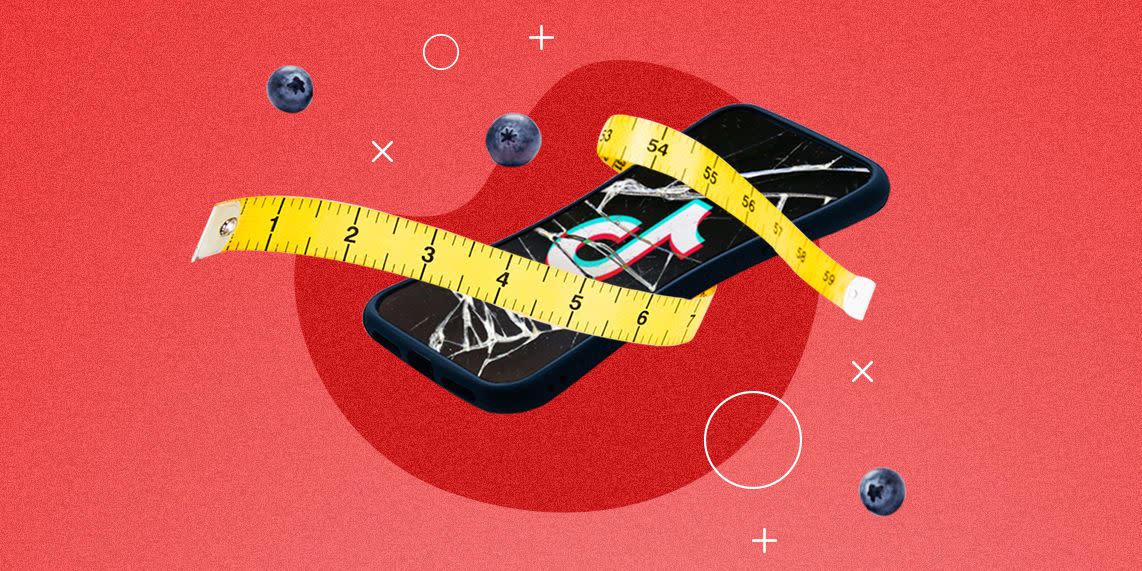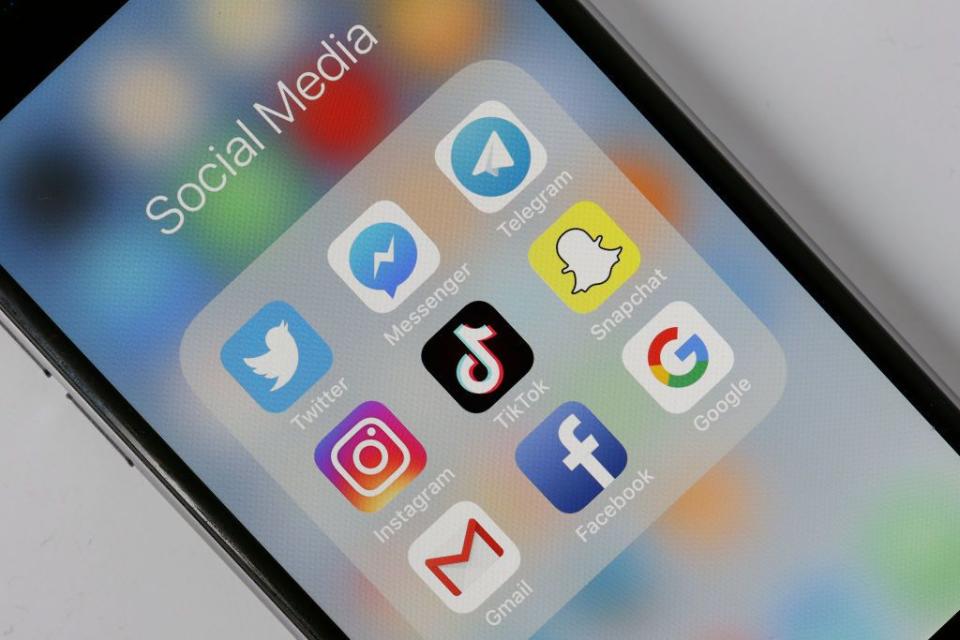We Need To Talk About TikTok's Dangerous Diet Culture

Trigger warning: This story makes mention of eating disorders and dangerous food habits. If you or someone you know is struggling with an eating disorder, call 1-(800)-931-2237 or visit NEDA.
You can pretend if you'd like, but the facts are real: TikTok is a whole lot of fun. Pushing the copycat dances aside (sorry!), there's still plenty of good stuff to sink into on the app, and food TikTok is a great place to start. However, there's an insidious subsection of it that is cause for concern. On any given day or hour you can find an alarming number of videos about food that lean into harmful dieting trends and often glorify unhealthy eating habits.
A quick scan of #WhatIEatInADay—a hashtag that boasts 3.6 billion views—can land you in a sea of videos starring young adults, mostly women, eating dangerously few calories per day, subsisting on a hyper-restrictive meal plan of giant cups of iced coffee, warm lemon water, and five cashews. Or you'll see the other end of it, featuring someone gorging, allegedly, on several servings of rich, decadent, high-fat, sugar-soaked, junk food. It's feast or famine, literally.
Thanks to the COVID-19 pandemic, you're probably eating most—if not all—of your meals at home. You're also clinging to social media by your fingertips to feel like you're still connected to community and linked into the world outside of your same four walls. TikTok has taken those two facts and boiled them together leaving you hungry for food content on the platform. But everything they serve doesn't necessarily do you good. You need smart tips and tricks to help navigate through the murkiness of the social media soup and pick out the best-for-you bites.

The Good, The Bad, And The Hungry
Yes, there's the good, like @hannahbreadtok's bread baking videos or @bobbysrey's mellow "hey guys, here's another cake decorating video" opening line to soothe your restless soul, but there's just as much of the bad to counter it: videos promoting things such as radical fasting, highly restricted diets, bizarre snack hacks like using bell peppers in place of bread or dipping carrots in mustard instead of french fries in ketchup. Also, there are the dangerous habits that start from a healthy place, such as being mindful about the nutritional value of your food then getting extreme with it, resulting in orthorexia.
"Orthorexia is an extreme fixation on the purity of foods and the constant preoccupation with healthy eating," explains Angie Asche, RD, a certified specialist in sports dietetics at Eleat Sports Nutrition, in Lincoln, NE.
What makes navigating this fine line between helpful and harmful content more complicated is the strength of TikTok's algorithm. It can be a nonstop delivery of millions of detrimental videos to its faithful young audience, says Olivia Napoleon, a registered dietitian at The Renfrew Center in Radnor, PA.
"These unhealthy behaviors on TikTok being presented as 'normal' eating habits can be so dangerous," she says. "Most are promoting depriving your body of energy and nutrients, which can lead to metabolic changes, slowed metabolism, the breakdown of your body's organs and muscles, and other serious complications."
Of course, unhealthy diet trends are not exclusive to social media. There's a long history of get-slim-quick fads that have had their turn in the spotlight before getting bumped by the next new cleanse, potion, or food to banish from your plate. Whatever it takes to look good remains the mantra for many willing to try everything but the kitchen sink to achieve the "perfect" body. Social media—and now the pandemic—just amplified things, says Claire Mysko, CEO of the National Eating Disorders Association.
"Social media has created an environment where dieting information can be shared farther and wider than ever before," she says. It gets the comparison machine working on overdrive and makes the mimicking of behaviors almost too easy. "This can often lead to the exacerbation or creation of complicated relationships with food, which sometimes lead to eating disorders," Mysko says.
It's the Bad Intel For Me
Gen Z was basically born with social media mixed into their milk. They often trust their friends over some random talking head on cable news. They go to the internet and social to get their news and information from peers, influencers, celebrities they stan, and companies they follow online. They tread on the heels of these trendsetters "regardless of how dangerous and unfounded these trends may be," says Mysko.
The content on TikTok isn't filtered through the typical systems that can weed out harmful or false messages, says Alyssa L. Booth, a licensed professional counselor and intuitive eating coach in San Antonio. "These influencers are putting young lives at risk."
One way to try to avoid falling into these precarious intel traps is to carefully curate your feed on TikTok. Follow accounts that promote body positivity (like @brittanilancaster, a 23-year-old sharing her recovery journey from disordered eating). Search out more registered dietitians (RDs) and engage with their videos. This will alter the algorithm so you start seeing more TikToks pop up on your "For You" page with information that is actually evidence-based, says Aja Gyimah, a Toronto-based RD. "We are the nutrition experts, and we are regulated by professional organizations to ensure that the information we provide to the public is backed by science and evidence."
And most of these experts on TikTok are there for the fun, too. They know that no one has the tolerance for dry, finger-wagging lectures. See Gyimah's cute video bashing unhealthy eating habits.
While you won't be able to completely cancel every negative or harmful message around diet culture—it is still the internet, after all—you can take action to keep shifting the algorithm your way, says Kim Greene Murachver, an RD, certified intuitive eating counselor, and owner of Greene Nutrition in Acton, MA. "Start clicking 'not interested' on those videos and unfollow the accounts that increase negative thoughts about yourself and body image," she says. And if you're unsure if the video is triggering internal negativity, Greene says to ask yourself: Is this helpful? If no, then it's got to go.
You can always limit your time on the app, too. Set a timer and when it goes off, log off and engage in something that makes you feel good inside and out. Take a walk, eat a nourishing snack, or…practice one of those TikTok dances offline!
Nicole Blades is a novelist, speaker, journalist, and certified personal trainer. Her work has appeared in The New York Times, Runner's World, Women's Health, Writer's Digest, MarieClaire.com, and, now, Delish.
You Might Also Like

